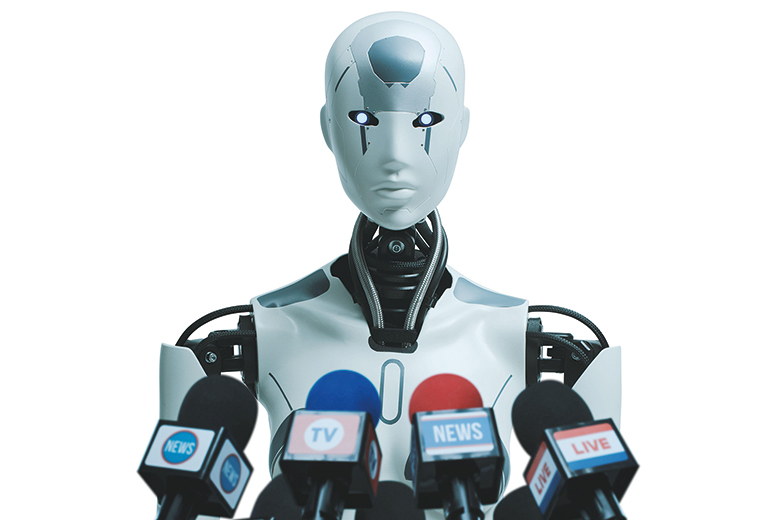By the end of this year, about 4 billion citizens across more than 40 countries will have voted in elections.
Accordingly, the early months of 2024 saw a global outpouring of speculation about the democratic collapse that might be caused by artificial intelligence (AI)-enabled online disinformation. Most of the commentary focused on the potential for highly realistic deepfake video to deceive the public. Some predicted the “first deepfake elections”.
This was part of the “hype cycle” that history tells us all new technologies go through. Inflated early expectations of social and political impact – rose-tinted or, as here, doom-laden – are displaced over time by the realities of evidence and adaptation.
The important thing is to quickly get beyond the hype – and the fatalism and sense of powerlessness it can promote – and focus on the technology’s real and lasting effects. These are often substantial but subtle, complex and more gradually felt than forecast by early optimists and pessimists.
ADVERTISEMENT
The challenge for researchers across all disciplines, then, is to learn rapidly from events and help citizens and regulators pinpoint when, where and how AI makes a difference – positive or negative – to civic life.
In the event, there was no apparent deepfake crisis in the UK election, but this produced a narrative just as unhelpful as the doom-mongering. “Nothing to see here” quickly became the new vogue – just as revelations were emerging of some serious cases of AI-driven disinformation.
ADVERTISEMENT
During the campaign’s final weekend, investigative journalists at Australia’s ABC News uncovered a coordinated foreign disinformation campaign targeting UK citizens on Facebook with divisive, often racist material (some of it illegal, unlabelled paid advertisements). Fake, AI-generated images were common – showing, for example, groups of asylum seekers massing at the UK coast.
Facebook’s parent company, Meta, took it all down as Rishi Sunak issued a formal statement of concern. A government investigation was reportedly set up, but, by then, polling day had arrived.
Meanwhile, Germany’s main public service news organisation, ARD-aktuell, reported that similarly racist, anti-immigrant accounts on X were targeting the UK elections. The environmental campaign group Global Witness confirmed that automated X accounts were spreading divisive disinformation on climate change and migration, in posts viewed 150 million times. And two days after the UK vote, the Bureau of Investigative Journalism revealed that a Kremlin-backed network of fake news sites had targeted the UK, French and US campaigns.
Three ways to promote critical engagement with GenAI
Significantly, though, the much-feared deepfake videos – which, for now at least, remain difficult to produce – were largely absent from these influencing operations, illustrating that AI-generated prose, still images and audio could actually prove more consequential.
The network included sites that intelligence consultancy Recorded Future revealed in May as having used AI to “plagiarise, translate and edit content from mainstream media outlets, using prompt engineering to tailor content to specific audiences and introduce political bias”.
Meanwhile, at the start of the year, a canvassing call that used a synthetic version of Joe Biden’s voice disrupted the New Hampshire primary. A convincing fabricated audio clip of Sadiq Kahn affected spring’s London mayoral campaign. Equally convincing fake audio depicting health secretary Wes Streeting emerged during the UK general election.
ADVERTISEMENT
Much of that campaign’s AI-generated visual fakery, such as the material ABC uncovered, consisted of still images. But, as we have also seen over recent weeks in the US campaign, most of these are not even photo-realistic. Evidently, they can still elicit strong emotions, but the fact that they are instantly recognisable due to their digital-paint aesthetic is due to leading generative AI platforms’ efforts – initiated under pressure from fact checkers, citizens and emerging regulators – to restrict how they respond to user prompts.
These moves gathered momentum after February’s signing by major global tech companies of an AI Elections Accord. And though still highly imperfect and unevenly applied (for example on X’s Grok platform), they show how public pressure for regulatory guard rails can shape design choices that safeguard democracy.
ADVERTISEMENT
In other words, the social contexts of new technologies change as organisations and people adapt to them. Agile, well-informed regulation is achievable and starting to emerge, and vigilance among public bodies, media organisations and policy wonks about electoral threats is increasing.
The UK Cabinet Office issued guidance on generative AI to electoral candidates and local officials. The government established a Joint Election Security Preparations Unit in early 2024. And during the campaign itself, a simple but effective Channel 4 Dispatches documentary highlighted deepfakes, further raising awareness. We’re not as susceptible as we once were.
Moreover, AI is starting to be used to promote accountability and fight fakery. While AI-driven online microtargeting has not yet taken off in election campaigns, the Labour Party experimented with Campaign Lab’s chatbot scripts to help canvassers communicate effectively with voters, using research by the anti-polarisation thinktank More in Common. And an Electoral Commission guidance bot helped candidates stay within the increasingly complex law regulating privacy and spending.
Similar tools are now used to help human fact checkers – at the UK’s Full Fact, for example. Meanwhile, evidence from the US suggests prose AI generators can help journalists provide sophisticated rapid responses to live televised debates.
Universities across the world must lend their weight to such efforts. They must sidestep the hype cycle to help regulators and communicators respond quickly and effectively to the threat of online disinformation in time for the next big year of elections.
Andrew Chadwick is professor of political communication and director of the Online Civic Culture Centre at Loughborough University. Nick Jennings is vice-chancellor of Loughborough and was the UK’s chief scientific adviser for national security from 2010 to 2015.
ADVERTISEMENT










